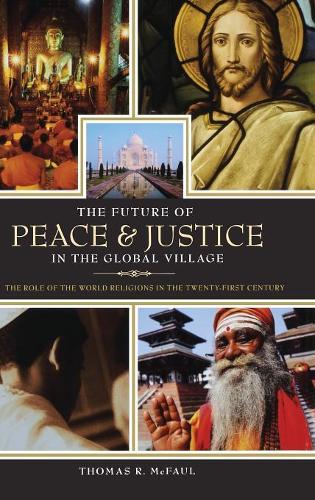
The Future of Peace and Justice in the Global Village: The Role of the World Religions in the Twenty-first Century
(Hardback)
Publishing Details
The Future of Peace and Justice in the Global Village: The Role of the World Religions in the Twenty-first Century
By (Author) Thomas R. McFaul
Bloomsbury Publishing PLC
Praeger Publishers Inc
30th September 2006
United States
Classifications
Tertiary Education
Non Fiction
Politics and government
Globalization
201.72
Physical Properties
Hardback
240
Description
Many authors have written on the effect technology, economics, and politics have on globalization, but few have addressed the potential impact of world religions on the future direction of globalization. McFaul's fascinating book explores what others have not: the part the world's major religionsHinduism, Buddhism, Jainism, Zoroastrianism, Judaism, Christianity, and Islamwill play in bringing either greater peace and justice or hatred and hostility to the global village. Will these religions, which exert the greatest amount of influence worldwide, be a force for good or ill in the emerging global village of the 21st century This book answers that question and more. Covering the religions to which the majority of world's population adheres, it offers insight into the commonalities, differences, and potential for coming together to create peace to be found among the major faiths. The world's seven major religions are covered, and topics such as sexuality, ethics, violence, and the tension between secular and sacred arenas are discussed for each. McFaul argues that if the leaders and laity of these religions are able to find common ground, efforts toward peace and justice in the global village can be more effective and lasting. If they accentuate their differences, he suggests, they will only produce more hatred and hostility.
Reviews
In describing this work, McFaul writes that it addresses one specific question: Will the global village be a place where the inhabitants experience an increase in peace and justice or hatred and hostility He explores the role that the world religions will play in shaping the answer to that question. After introducing the basic concepts underlying the discussion, he compares and contrasts the worldviews of major religions and explores the common ground between them. He then does the same with the ethics of the world religion. Finally, he applies the foregoing discussion to issues of violence; sex, sexuality, and gender, and the separation of the sacred from the secular and develops possible scenarios for the impact of the world religions on the course of the global village. * Reference & Research Book News *
Religion is a personal and often a deeply emotional experience influenced greatly by the past and challenged by the present technological advances. Becoming aware of various religious expressions, the ways in which they interact with one another, learning the value of inter-religious dialogue, and bringing forth the values and ethics that each offer are the challenges in an evalutionary process to find the common ground for peace and justice. The Future of Peace and Justice in the Global Village is an ideal resource and discussion starter for students of comparative religion studies, those involved in inter-religious dialogue, and for those interested in thinking globally and speculating futuristically. * The Catholic World *
Author Bio
Thomas R. McFaul is Professor of Ethics and Religious Studies Emeritus at North Central College in Naperville, Illinois. He is the author of Transformation Ethics: Developing the Christian Moral Imagination and many other articles and books.
